[toc]
Elasticsearch笔记2
- Elasticsearch版本为8.13.4
- kibana版本为8.13.4
索引操作
在elasticsearch中,索引相当于传统数据库中的表格,映射相当于传统数据库中定义的表结构定义。
索引:即相同类型的文档数据的集合。 映射:即文档数据中的各个字段定义,约束。
我们要向elasticsearch中存储数据,必须先创建索引(表格)和映射(表结构定义)。
Mapping 映射属性
在elasticsearch中,Mapping 映射属性相当于文档数据中的各个字段的定义。例如字段数据类型,字段约束。
因此下面介绍一些,常见的Mapping 映射属性有哪些。
- type:字段数据类型,常见的类型有:
- 字符串:text(可分词的文本)、keyword(精确值,例如:品牌、国家、ip地址)。keyword类型只能整体搜索,不支持搜索部分内容
- 数值:long、integer、short、byte、double、float、
- 布尔:boolean
- 日期:date
- 对象:object
- index:是否创建索引,默认为true。如果某个字段需要搜索,排序。就添加该属性。
- analyzer:使用哪种分词器。如果某个字段需要分词处理,就可以添加该属性。
- properties:该字段的子字段。如果某个字段需要子字段,就可以添加该属性。
动态映射
在Elasticsearch8.x以上的版本中,出现了一个新的动态映射的概念。
动态映射是指,当索引不存在或者索引没有设置Mapping 映射属性的时候。如果文档数据插入到索引库中,那么Elasticsearch会根据文档数据,自动为索引设置Mapping 映射属性。
动态映射的默认规则如下所示
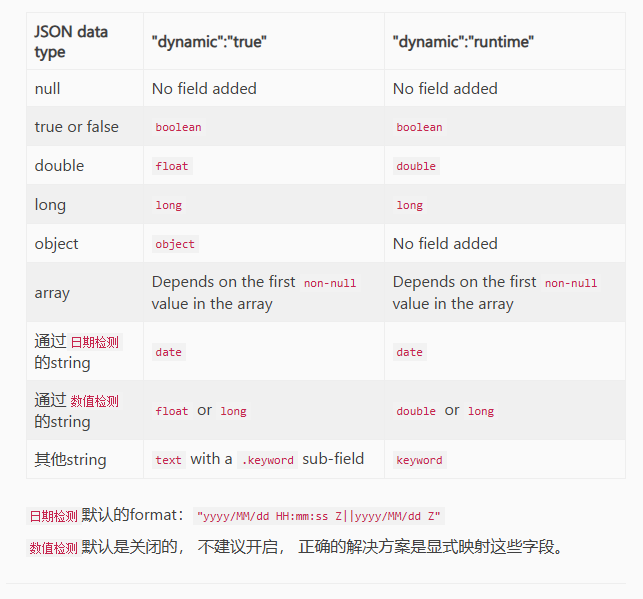
- 日期检测默认的格式:"yyyy/MM/dd HH:mm:ss 或 yyyy/MM/dd"
- 数值检测默认是关闭的, 不建议开启, 正确的解决方案是显式映射这些字段。
索引库的CRUD
这里在Kibana中的Dev Tools界面中,使用DSL语句来请求Elasticsearch的API接口,从而操作Elasticsearch。

创建索引库
创建索引库的语法如下。
// 下面的DSL语句的含义是,PUT请求,接口名称为索引库名称,请求数据为索引中的映射定义。
PUT /索引库名称
{
"mappings": { //该索引的映射属性mappings
"properties": { //properties 表示为mappings字段的子字段
"字段名1":{
"type": "text", //字段1的数据类型为text
"analyzer": "ik_smart" //字段1的使用ik_smart分词器
},
"字段名2":{
"type": "keyword", //字段2的数据类型为keyword
"index": "false" //不创建字段2的索引
},
"字段名3":{
"properties": { //properties 表示为字段名3的子字段
"子字段1": { //子字段1 是 字段3的子属性字段。
"type": "keyword" //子字段1的数据类型为keyword
}
}
},
// ...略
}
}
}例子:创建一个商品索引库。商品索引包含各个映射属性字段(id,goods_name,goods_price,goods_extend_info等)。
PUT /goods
{
"mappings": {
"properties": {
"id":{ //商品id字段
"type": "integer" //数据类型为integer
},
"goods_name":{ //商品名称字段
"type": "text", //数据类型为文本
"analyzer": "ik_smart" //使用ik分词器,进行分词处理
},
"goods_price":{ //商品价格字段
"type": "double", //数据类型为浮点数
"index": "false" //该字段不使用索引
},
"goods_extend_info":{ //商品额外信息字段
"type":"object", // 数据类型为object
"properties": {
"goods_size":{ //商品尺寸字段
"type": "integer"
},
"goods_origin":{ //商品产地字段
"type": "text"
}
}
}
// ...略
}
}
}如图所示,商品索引库创建成功 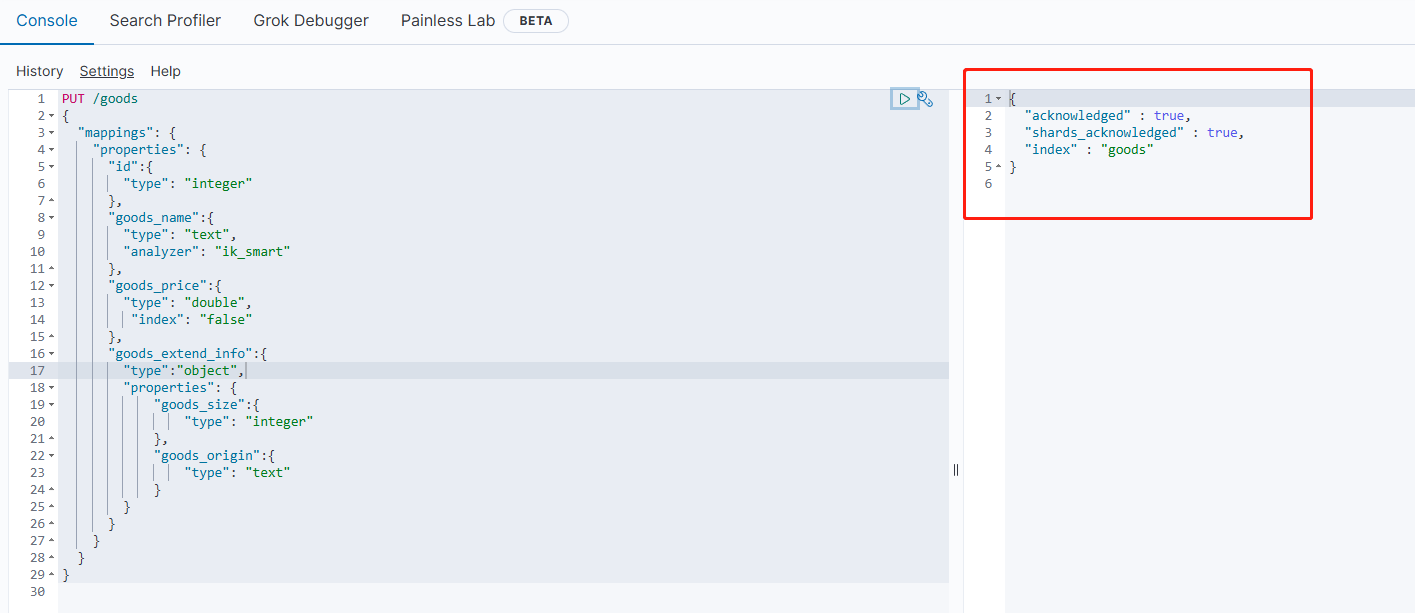
查询索引库
查询索引库的语法如下。
// 语法格式: GET /索引库名称
GET /goods如图所示,查询商品索引库。
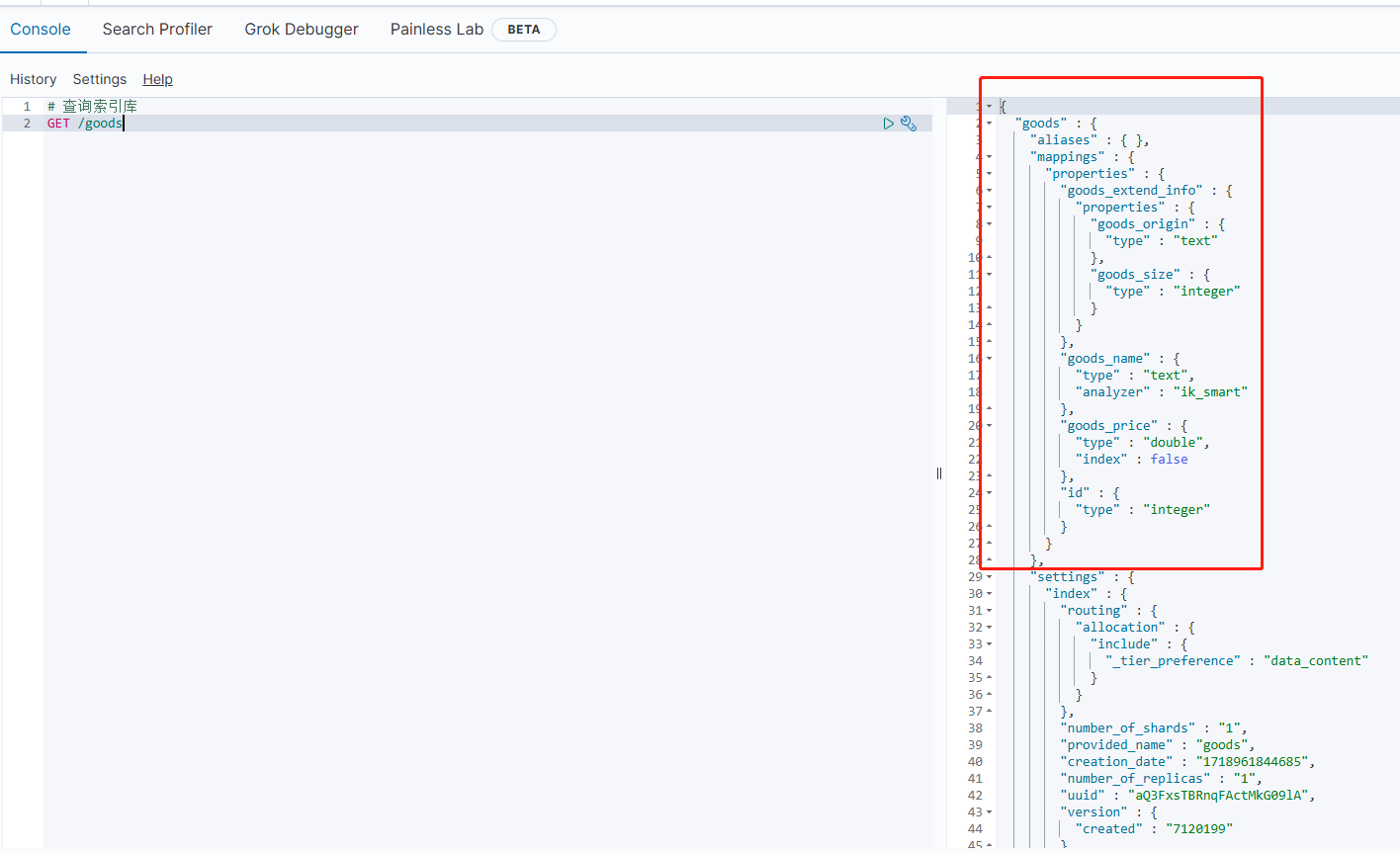
修改索引库
在elasticsearch中,无法修改索引库中已经存在的mapping映射属性。只能增加新的mapping映射属性到索引中。
修改索引库的语法如下。
// 语法格式
PUT /索引库名/_mapping
{
"properties": {
"新字段名":{
"type": "integer"
}
}
}
//例子,给商品索引库,新增商品日期字段
PUT /goods/_mapping
{
"properties": {
"goods_date":{
"type": "date"
}
}
}如图所示 
删除索引库
删除索引库的语法如下。
// 语法格式: DELETE /索引库名称
// 例子 删除商品索引库
DELETE /goods如图所示 
文档操作
当索引库创建好后。我们就需要操作索引库中的数据,即文档数据。
这里在Kibana中的Dev Tools界面中,使用DSL语句来请求Elasticsearch的API接口,从而操作Elasticsearch。

文档的CRUD
- 创建文档:POST /{索引库名}/_doc/文档id
- 查询文档:GET /{索引库名}/_doc/文档id
- 删除文档:DELETE /{索引库名}/_doc/文档id
- 修改文档:
- 全量修改:PUT /{索引库名}/_doc/文档id
- 增量修改:POST /{索引库名}/_update/文档id
新增文档数据
//新增文档数据 语法如下
POST /索引库名/_doc/文档id
{
"字段1": "值1",
"字段2": "值2",
"字段3": {
"子属性1": "值3",
"子属性2": "值4"
},
// ...
}
//例子,新增id为1的文档数据
POST /goods/_doc/1
{
"id":1,
"goods_name": "小米手机",
"goods_price": 1999,
"goods_extend_info": {
"goods_size": 100,
"goods_origin": "湖北"
}
}如图所示,运行结果 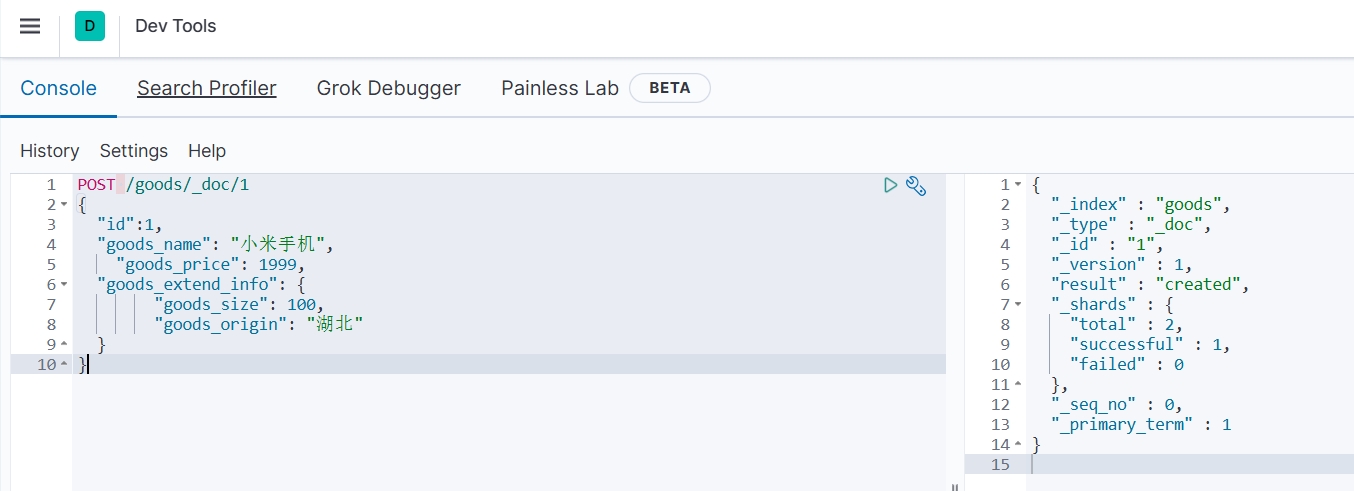
查询文档数据
//查询文档数据 语法如下
GET /{索引库名称}/_doc/{id}
//批量查询:查询该索引库下的全部文档
GET /{索引库名称}/_search
//例子,查询id为1的商品文档数据
GET /goods/_doc/1
//查询所有的商品文档数据
GET /goods/_search如图所示,运行结果 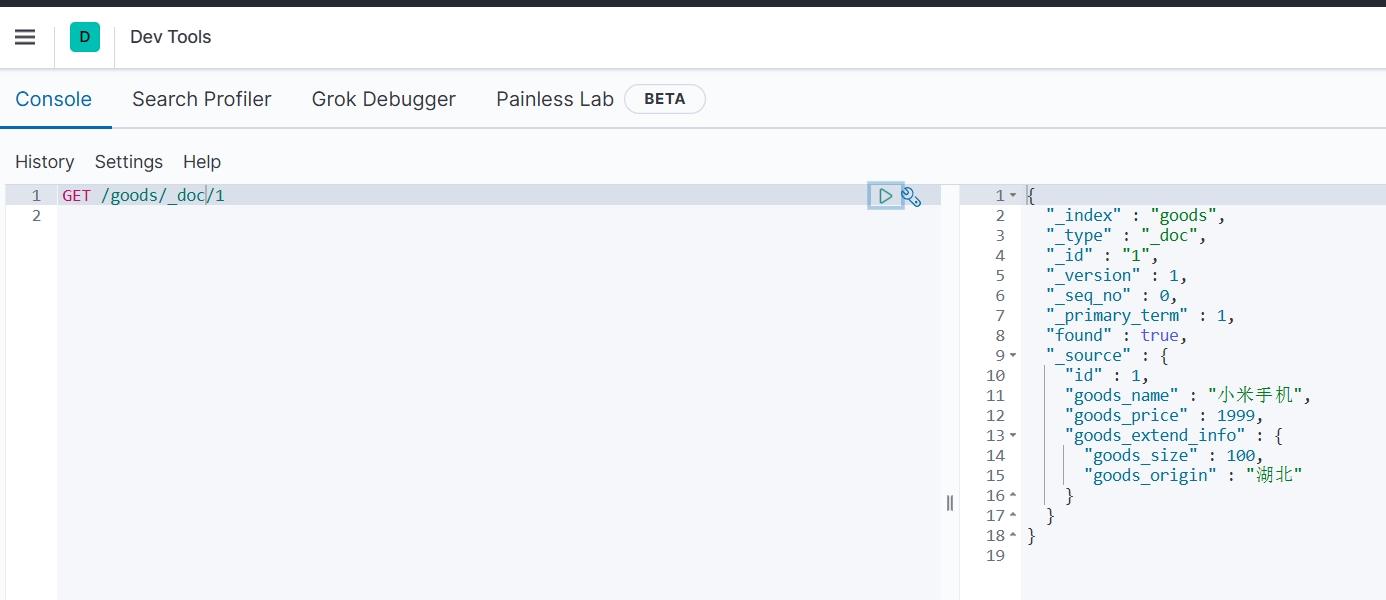
修改文档数据
修改文档数据有两种方式:
- 全量修改:会直接覆盖原来的文档数据。相当于先删除,后新增。
- 增量修改:直接修改文档中的部分字段数据。
// 全量修改文档数据 语法如下
PUT /{索引库名}/_doc/文档id
{
"字段1": "值1",
"字段2": "值2",
// ... 略
}
// 增量修改文档数据,语法如下
POST /{索引库名}/_update/文档id
{
"doc": {
"字段名": "新的值",
}
}
//例子 全量修改 id为1的商品文档数据
PUT /goods/_doc/1
{
"id":1,
"goods_name": "华为手机",
"goods_price": 3999,
"goods_extend_info": {
"goods_size": 100,
"goods_origin": "北京"
}
}
//例子 增量修改 id为1的商品文档数据中的goods_name字段
POST /goods/_update/1
{
"doc": {
"goods_name": "华为手机Mate20"
}
}删除文档数据
// 删除文档数据 语法如下
DELETE /{索引库名}/_doc/id值
//例子 删除id为1的商品文档数据
DELETE /goods/_doc/1SpringBoot整合ElasticSearch8
目前ElasticSearch版本为8.13.4 ,SpringBoot版本为3.3.1。
在ElasticSearch 8.x的版本中,ES提供了一个新的API客户端 Elasticsearch Java API Client。如果我们想要用Java去调用ElasticSearch 8.x的API接口,那么我们需要使用这个客户端。
并且为了方便本地测试,我们可以在ES的配置文件中关闭xpack安全认证(用户名+密码+HTTPS)。
导入依赖
导入spring-boot-starter-data-elasticsearch依赖。
<dependency>
<groupId>org.springframework.boot</groupId>
<artifactId>spring-boot-starter-data-elasticsearch</artifactId>
</dependency>如果你的springboot的版本为3.3.1,那么上面的代码会自动导入spring-boot-starter-data-elasticsearch依赖的3.3.1版本。
并且该依赖内置了
- co.elastic.clients.elasticsearch-java依赖的8.13.4版本
- org.elasticsearch.client.elasticsearch-rest-client依赖的8.13.4版本
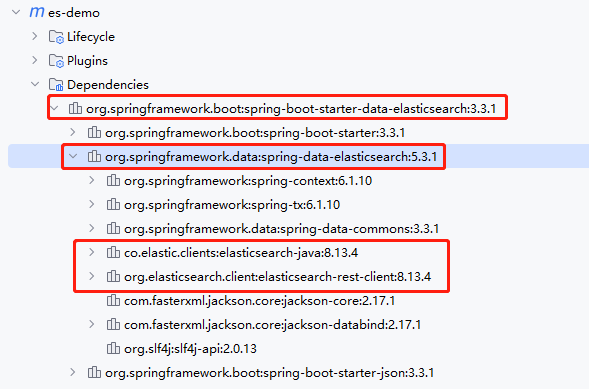
创建客户端对象
package com.example.esdemo.config;
import co.elastic.clients.elasticsearch.ElasticsearchClient;
import co.elastic.clients.json.jackson.JacksonJsonpMapper;
import co.elastic.clients.transport.ElasticsearchTransport;
import co.elastic.clients.transport.rest_client.RestClientTransport;
import org.apache.http.HttpHost;
import org.elasticsearch.client.RestClient;
import org.elasticsearch.client.RestClientBuilder;
import org.springframework.context.annotation.Bean;
import org.springframework.context.annotation.Configuration;
@Configuration
public class ElasticSearchConfig {
//创建ElasticsearchClient客户端对象,并注入IOC容器中
@Bean
public ElasticsearchClient elasticsearchClient(){
//创建构建器对象RestClientBuilder
//RestClientBuilder: ES客户端库的构建器接口,用于构建RestClient实例;
//可以配置与Elasticsearch集群的连接,设置请求超时,设置身份验证,配置代理等
RestClientBuilder builder = RestClient.builder(new HttpHost("localhost", 39200,"http"));
// 连接延时配置
builder.setRequestConfigCallback(requestConfigBuilder -> {
//设置连接超时时间
requestConfigBuilder.setConnectTimeout(1000);
//设置连接超时时间
requestConfigBuilder.setSocketTimeout(30000);
//设置请求超时时间
requestConfigBuilder.setConnectionRequestTimeout(1000);
return requestConfigBuilder;
});
// 连接数配置
builder.setHttpClientConfigCallback(httpClientBuilder -> {
//设置最大连接数
httpClientBuilder.setMaxConnTotal(100);
//设置每个路由的最大连接数
httpClientBuilder.setMaxConnPerRoute(100);
return httpClientBuilder;
});
//通过构建器对象RestClientBuilder 创建 RestClient对象,最后创建出ElasticsearchClient对象
RestClient client = builder.build();
ElasticsearchTransport transport = new RestClientTransport(client,new JacksonJsonpMapper());
ElasticsearchClient esClient = new ElasticsearchClient(transport);
return esClient;
}
}索引操作
创建测试类进行测试。
注意:在elasticSearch8.x版本中。如果索引没有设置好映射Mapping属性。当文档数据插入到索引库中的时候,es会自动根据文档数据,自动给索引创建映射Mapping属性。
因此我们无需提前设置好索引的映射Mapping属性
@SpringBootTest
@Slf4j
class EsDemoApplicationTests {
@Autowired
private ElasticsearchClient elasticsearchClient;
/**
* 创建索引
* @throws IOException
*/
@Test
public void createIndex() throws IOException {
CreateIndexResponse response = elasticsearchClient.indices().create(c -> c.index("user_index"));
//响应状态
boolean acknowledged = response.acknowledged();
boolean shardsAcknowledged = response.shardsAcknowledged();
String index = response.index();
log.info("创建索引状态:{}",acknowledged);
log.info("已确认的分片:{}",shardsAcknowledged);
log.info("索引名称:{}",index);
}
/**
* 查询索引
* @throws IOException
*/
@Test
public void queryIndex() throws IOException {
// 查看指定索引
GetIndexResponse response = elasticsearchClient.indices().get(s -> s.index("user_index"));
Map<String, IndexState> result = response.result();
result.forEach((k, v) -> log.info("key = {},value = {}",k ,v));
}
/**
* 判断索引是否存在
* @throws IOException
*/
@Test
public void existsIndex() throws IOException {
BooleanResponse response = elasticsearchClient.indices().exists(e -> e.index("user_index"));
System.out.println(response.value());
}
/**
* 删除索引
* @throws IOException
*/
@Test
public void deleteTest() throws IOException {
DeleteIndexResponse response = elasticsearchClient.indices().delete(d -> d.index("user_index"));
System.out.println(response.acknowledged());
}
}文档操作
创建测试类进行测试。
- 创建文档对应的实体类。
@Data
@AllArgsConstructor
public class UserIndex {
private String id;
private String name;
private Integer age;
}- 编写测试类
package com.example.esdemo;
@SpringBootTest
@Slf4j
class EsDemoApplicationTests {
@Autowired
private ElasticsearchClient elasticsearchClient;
/**
* 新增文档数据
* @throws IOException
*/
@Test
public void addDocument() throws IOException {
//创建一个user对象
UserIndex user = new UserIndex(1,"user1", 10);
//将user对象转换为文档数据,并添加到user_index索引中
IndexResponse response = elasticsearchClient.index(i -> i.index("user_index").id(user.getId().toString()).document(user));
log.info("新增文档操作结果:{}",response.result().jsonValue());
}
/**
* 更新文档数据
* @throws IOException
*/
@Test
public void updateDocument() throws IOException {
UserIndex user2 = new UserIndex(2, "user2", 13);
// 更新user_index 索引中的id为1的文档数据,更新为user2对象
UpdateResponse<UserIndex> response = elasticsearchClient.update(u -> u.index("user_index").id("1").doc(user2), UserIndex.class);
log.info("更新文档操作结果:{}",response.result());
}
/**
* 查询文档数据
* @throws IOException
*/
@Test
public void getDocument() throws IOException {
//在user_index索引中,查询id为1的文档数据
GetResponse<UserIndex> response = elasticsearchClient.get(g -> g.index("user_index").id("1"), UserIndex.class);
log.info("查询文档操作结果:{}",response.source());
}
/**
* 删除文档数据
* @throws IOException
*/
@Test
public void deleteDocumentTest() throws IOException {
//删除user_index 索引中的id为1的文档数据
DeleteResponse response = elasticsearchClient.delete(d -> d.index("user_index").id("1"));
log.info("删除文档操作结果:{}",response.result());
}
/**
* 批量新增文档数据
* @throws IOException
*/
@Test
public void batchAddDocument() throws IOException {
List<UserIndex> users = new ArrayList<>();
users.add(new UserIndex(1, "阿一", 20));
users.add(new UserIndex(2,"阿二",25));
users.add(new UserIndex(3,"阿三",22));
users.add(new UserIndex(4,"阿四",20));
BulkRequest.Builder br = new BulkRequest.Builder();
for (UserIndex user : users) {
br.operations(op -> op
.index(idx -> idx
.index("user_index")
.id(user.getId().toString())
.document(user)));
}
BulkResponse response = elasticsearchClient.bulk(br.build());
log.info("批量新增文档数据结果:{}",response);
}
/**
* 批量删除文档数据
* @throws IOException
*/
@Test
public void batchDeleteDocument() throws IOException {
List<String> list = new ArrayList<>();
list.add("1");
list.add("2");
list.add("3");
list.add("4");
List<BulkOperation> bulkOperations = new ArrayList<>();
list.forEach(a ->bulkOperations.add(BulkOperation.of(b -> b.delete(c -> c.id(a)))));
BulkRequest.Builder br = new BulkRequest.Builder();
for (String s : list) {
br.operations(op -> op.delete(c -> c.id(s)));
}
BulkResponse response = elasticsearchClient.bulk(br.build());
log.info("批量删除文档数据结果:{}",response);
}
}查询操作
- 普通搜索查询
- 模糊查询
package com.example.esdemo;
@SpringBootTest
@Slf4j
class EsDemoApplicationTests02 {
@Autowired
private ElasticsearchClient elasticsearchClient;
/**
* 普通搜索查询
*
* @throws IOException ioexception
*/
@Test
void searchOne() throws IOException {
String searchText = "华为手机";
SearchResponse<UserIndex> response = elasticsearchClient.search(s -> s
// 搜索的索引的名称
.index("user_index")
// 查询
.query(q -> q.match(t -> t
// field为文档中的字段,此处是name属性字段
.field("name")
//查询内容
.query(searchText)
)
),
// 匹配文档的目标类
UserIndex.class
);
//打印查询数量
TotalHits total = response.hits().total();
log.info("查询结果数量 total 为 {}",total.value());
//打印查询结果
List<Hit<UserIndex>> hits = response.hits().hits();
log.info("查询内容为:{}",hits);
}
/**
* 模糊查询
* @throws IOException ioexception
*/
@Test
void fuzzyQuerySearch() throws IOException
{
SearchResponse<UserIndex> response = elasticsearchClient.search(s -> s.index("user_index")
//fuzzy 模糊查询 field 字段 value 模糊查询的内容 fuzziness代表可以与关键词有误差的字数,可选值为0、1、2这三项
.query(q -> q.fuzzy(f -> f.field("name").value("阿").fuzziness("2")))
// 过滤排序
.source(source -> source.filter(f -> f.includes("name","id").excludes(""))),
UserIndex.class
);
//打印查询数量
TotalHits total = response.hits().total();
log.info("查询结果数量 total 为 {}",total.value());
//打印查询结果
List<Hit<UserIndex>> hits = response.hits().hits();
log.info("查询内容为:{}",hits);
}
}